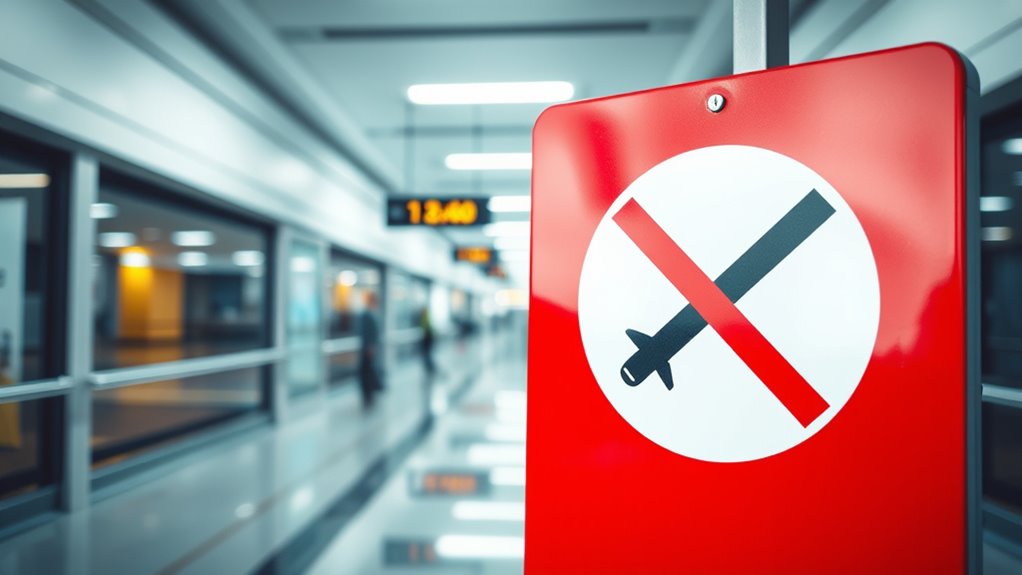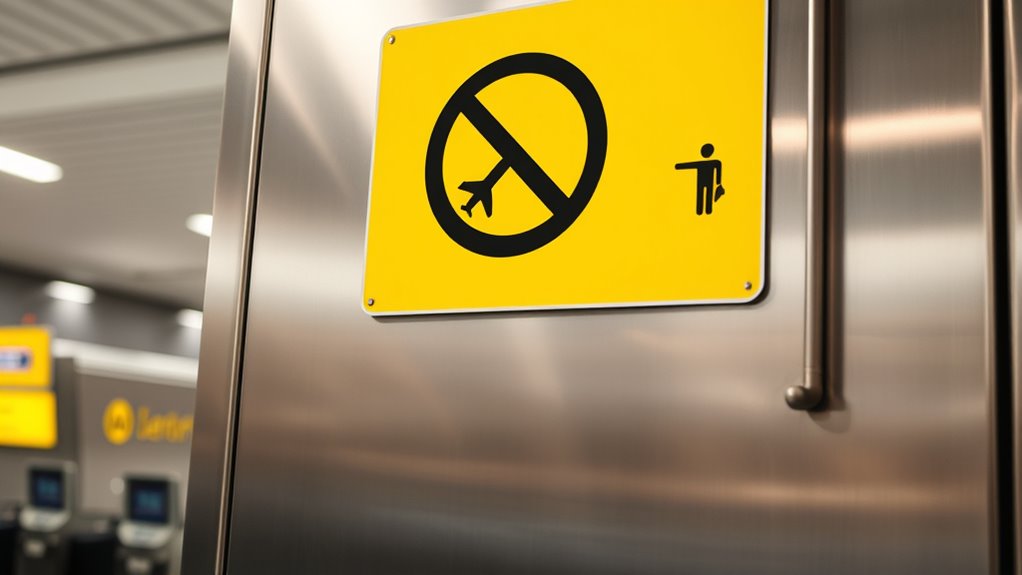Flying with an outstanding warrant is risky because airport security systems are connected to law enforcement databases and actively flag individuals with active warrants. If your warrant is detected, security personnel may escalate the situation, leading to your detention or arrest before boarding. Trying to hide or ignore the warrant doesn’t usually work, as authorities regularly update and cross-check records. To understand how warrants can affect your travel plans and what steps to take, keep exploring this important topic.
Key Takeaways
- Airport security systems check passenger info against law enforcement databases, which can detect outstanding warrants.
- Active warrants may lead to detention or arrest before boarding if identified during security screening.
- Resolving warrants legally beforehand reduces the risk of being flagged or detained at the airport.
- Security personnel verify IDs and can escalate checks if matching warrant records are found.
- Attempting to fly with an unresolved warrant poses legal and safety risks, making resolution the safest option.

If you have a warrant out for your arrest, flying can become a complicated and risky situation. Airports are equipped with security measures that can detect outstanding warrants, which means you might not get very far if law enforcement or airport security personnel identify you as a person of interest. When you approach airport security, they often perform routine checks against databases that include arrest warrants. If your warrant is active and visible, security personnel may flag your boarding process, leading to possible detention or arrest before you even reach your gate.
Having an outstanding warrant can complicate and jeopardize your travel plans at airports.
One of the key steps you might consider is warrant cancellation. If you’re aware of an outstanding warrant, addressing it beforehand can help you avoid complications at the airport. Clearing a warrant involves working with law enforcement or legal counsel to resolve the issue legally, which can include paying fines, attending court hearings, or completing other legal obligations. Once the warrant is canceled or recalled, the risk of being detained at airport security drops considerably. However, it’s essential to understand that warrant cancellation isn’t always immediate or guaranteed, especially if the warrant was issued for serious charges or remains unresolved.
In many cases, airport security systems are linked to law enforcement databases that are updated regularly. This means that even if you try to conceal your warrant or avoid detection, there’s a real chance that airport security might pick up on it during routine checks. Security personnel aren’t just screening for threats; they also verify identification against criminal databases. If your name or details match those with an active warrant, airport security could escalate the situation quickly. This might involve notifying law enforcement officers, who could then take you into custody before you board your flight.
Trying to fly with an outstanding warrant isn’t advisable. Even if you manage to get through security initially, there’s always the risk of being detained later, either at the airport or at your destination. Furthermore, having a warrant active can cause additional legal complications if you’re caught trying to evade law enforcement or attempting to fly without resolving the issue. The best course of action is to address the warrant beforehand—seek legal advice, work toward warrant cancellation, and resolve any underlying issues. Doing so not only helps you avoid legal trouble at the airport but also clears the way for trouble-free travel in the future.
Frequently Asked Questions
Can I Travel Internationally With an Outstanding Warrant?
You might face travel restrictions if you have an outstanding warrant, as authorities can detain you at border crossings. It’s essential to obtain warrant clearance before planning international travel. Without it, you risk detention or denied boarding. Always check with legal authorities or your attorney to guarantee your warrant is resolved, preventing potential legal issues. Being proactive helps you avoid surprises at airports and ensures smoother international trips.
What Happens if I’M Detained at the Airport With a Warrant?
If you’re detained at the airport with an outstanding warrant, you’ll likely face immediate legal consequences, including arrest. Studies show over 20% of travelers with warrants are detained during security checks. This results in strict flight restrictions, delaying your plans and possibly leading to jail. You won’t be able to board your flight, and authorities will handle the legal process. It’s essential to resolve warrants beforehand to avoid these complications.
Are Warrant Warnings Visible to All TSA Agents?
Warrant visibility varies, but TSA agents are trained to stay alert for alerts or alerts in their systems. They have access to databases and alert systems that notify them of outstanding warrants, so your warrant could be flagged without it being immediately visible to them. TSA awareness is high, and they’re trained to identify potential issues, making it likely they’ll notice if your warrant is flagged during security screening.
Can Warrants Be Dismissed Before Flying?
You wonder if warrants can be dismissed before flying, but the truth is, it’s rarely straightforward. While you might think legal consequences can be avoided through warrant clearance, authorities often keep records that can surface unexpectedly. Dismissing a warrant requires legal action, not just a quick fix. If you’re facing this, consult a lawyer immediately. Otherwise, flying with an outstanding warrant risks serious legal trouble, even if you try to clear it first.
Do All Airports Have Warrant Warning Signs?
Most airports don’t have explicit warrant signage, but airport alerts and security measures are in place to identify individuals with warrants. Staff and security personnel are trained to recognize these alerts, so they may intervene if necessary. While not all airports display warrant signage, it’s important to stay aware of security procedures. If you have an outstanding warrant, it’s best to resolve it beforehand to avoid complications during your travel.
Conclusion
So, next time you’re rushing through the airport, remember those warning signs aren’t just for show. It’s a strange coincidence how often a simple oversight or misunderstanding can lead to serious trouble with outstanding warrants. Staying aware and checking your status might just save you from an unexpected delay—or worse. After all, in a place where timing is everything, a small detail can make all the difference. Stay vigilant, and fly safely.









